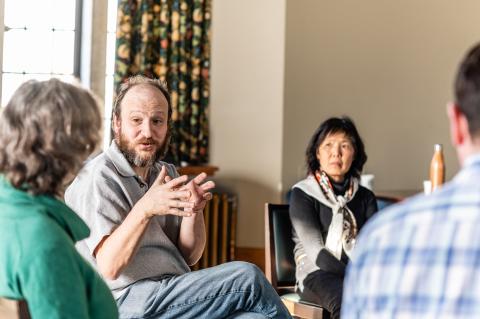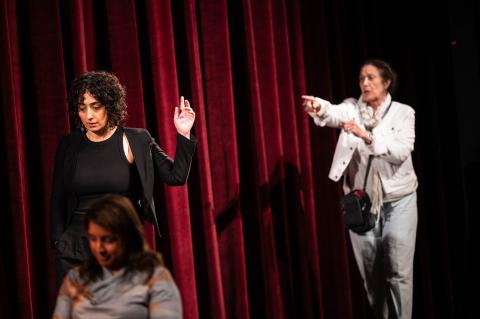Conflict Theatre offers faculty and staff the opportunity to explore and embrace conflict in the workplace using the tools of theatre.
Learn to see workplace conflict differently
Can you remember the last difficult conversation you had? If you had another chance, would you have said or done something else?
Tailored to the UBC context, Conflict Theatre offers a new way to look at old patterns and build the courage to approach workplace conflict differently.
The Conflict Theatre approach
Recognizes that workplace conflict is normal
Difficult conversations are commonplace in the office. It may arise due to contrasting perspectives or competing needs. Workplace conflict can be very damaging for employees and the organization alike. Conflict negatively effects employee wellbeing, retention, creativity, and productivity. While it is uncomfortable to experience interpersonal conflict, it becomes even more uncomfortable when avoided. Hence why Conflict Theatre encourages direct engagement with conflict through open, non-violent dialogue.
Grounds programming in Reflexive Conflict Management
Reflexive Conflict Management (RCM) is an approach to resolving interpersonal conflict. It was developed at UBC by Dr. Tom Scholte, Conflict Theatre's Faculty Lead. This approach is reflexive because it hinges on one's ability to examine their own emotions and motivations. These factors influence how we act in conflict situations. RCM emphasizes communicating one's needs with clarity and avoiding emotional escalation. This helps all parties involved in the conflict to identify potential solutions for its resolution.
Explores conflict engagement through theatre
Conflict Theatre programming offers a unique opportunity to rehearse this novel approach to conflict engagement. It does so by turning to the tools and techniques of theatre. Improvisational theatre and scripted plays can mimic real world conflicts and reveal the complexities of human relationships. Drama offers a playground for practicing the skills of conflict engagement in a safe, low stakes setting. This approach is experiential, immersive, and fun!
Engaging in Conflict Theatre programming requires no prior experience or background in theatre. Instead, individuals can participate in a way that feels most authentic and comfortable to them.
Promotes key learning goals
UBC staff and faculty who participate in or attend a Conflict Theatre event will:
- Strengthen empathy and understanding for many perspectives within conflict.
- Foster a curiosity-driven approach to conflict
Self-reflect to better understand their own emotions, context, perspective and patterns during conflict. - Gain a better understanding of how conflict arises, what keeps it going, and how it can be moved through.
- Become attuned to the systemic drivers of conflict and the leverage points available to address them.
- Join a community of colleagues interested in changing campus culture on conflict.
Types of Conflict Theatre events
Program testimonials
“Prior to the workshop I avoided conflict and often regretted my in-the-moment responses. The Summer Intensive prepared me to handle conflict directly, less emotionally and focus on de-escalation. I started leveraging my newfound skills immediately after completing the intensive, leading to less anxiety and more satisfaction with my approach to conflict resolution."
– Matt, M&P, Rehearsing Conflict Summer Intensive participant, June 2023
“Being able to communicate more effectively and authentically is a noble goal and one that should be pursued by anyone and everyone at UBC.”
– Alexis, Faculty, Rehearsing Conflict Summer Intensive participant, June 2023
“I noticed myself being more compassionate and generous towards those who may be instigators of conflict, because I had a better understanding of their motivations. This has made me more curious and open to looking deeply at conflict and finding ways to work with it. I'd recommend this to all employees interested in learning how to adapt in situations of challenge.”
– Anonymous, M&P, Rehearsing Conflict Summer Intensive participant, June 2023
"The live event and plays offered an experiential, visceral experience. What was surfaced still lingers in my thoughts. Just sitting in the audience and not getting on stage surfaced a lot of insight."
– Anonymous, Capstone Performance audience member, June 2023
Stay up-to-date
To stay informed about all things Conflict Theatre, subscribe to our mailing list via the button below. Subscribers to the monthly "Playbill" newsletter receive event reminders, featurettes, and more!
For more information about our program and opportunities, please email conflict.theatre@ubc.ca

